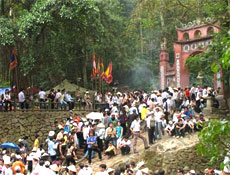The number of visitors to this year’s Hung Temple Festival has increased sharply over the past five days, according to the festival organising board.

About 1.5 million visitors visited the Hung Temple between April 14-18, presenting an increase of 30% over the same period of last year’s event, the board said.
This year’s Hung Temple Festival has been held on the largest-ever scale from April 14-23 (the first to the tenth day of the third lunar month), with the grand ceremony to be held on April 23.
Among the pilgrims on April 18 were Truong Tan Sang, Party Politburo member and Standing member of the Party Central Committee’s Secretariat and Nguyen Thi Doan, Vice State President.
The two officials offered gifts and burnt incense to the Hung Kings, praying for solidarity, peace and prosperity for the nation.
The same day, the AVINAA Joint Stock Company presented a one-metre high bottle of vodka as an offering and another bottle of over 4,000 litres to the festival for visitors to enjoy from the noon of April 18 to April 23.
The Hung Temple Festival has been held annually since 1460 under the reign of King Le Thanh Tong to commemorate the 18 Hung Kings who founded the country and started a golden age in the Vietnamese history.
Since then, the Hung Temple Festival has become a symbol of national unity and spirit and is a chance for Vietnamese people both at home and overseas to express their gratitude to their ancestors.
The anniversary of the death of the Hung Kings, which falls on the 10th day of the third lunar month, was officially recognised as a national celebration in 2000 and in 2007 the National Assembly approved a regulation making it a national holiday.
The Hung Temple is located on Nghia Linh Mountain, Phong Chau District, in Phu Tho Province, 100km northwest of Hanoi and is a complex of ancient tombs, monuments and temples.
Notably, the Lower Temple, a popular tourist destination, was according to legend, where Au Co gave birth to a sack containing 100 eggs from which 100 babies were born. The eldest son, Hung Vuong, named himself king and the throne was passed down over 18 generations.